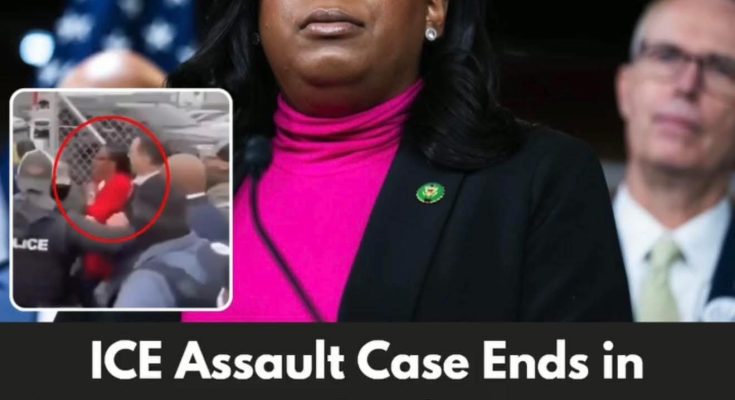Congressional Oversight Authority Under Scrutiny Following Federal Immigration Facility Incident
The intersection of congressional oversight responsibilities and federal law enforcement operations has become the center of a significant political and legal controversy involving a House representative’s conduct during an official facility visit. The incident has raised important questions about the boundaries of legislative oversight authority, appropriate conduct for elected officials, and the complex relationship between congressional duties and federal criminal law.
The controversy centers on events that occurred during what was described as a routine congressional oversight visit to a federal immigration facility, highlighting the tensions that can arise when legislative branch responsibilities intersect with executive branch operations and law enforcement protocols.
Background of Congressional Oversight in Immigration Policy
Congressional oversight of federal immigration operations represents a fundamental constitutional responsibility that allows the legislative branch to monitor executive agency performance, ensure compliance with established laws, and investigate potential policy implementation issues. These oversight activities typically involve facility visits, document requests, and formal hearings designed to provide transparency and accountability in government operations.
The House Committee on Homeland Security, along with other relevant congressional panels, regularly conducts oversight activities related to immigration enforcement agencies, detention facilities, and border security operations. These visits serve important democratic functions by providing elected representatives with direct observation of federal operations and opportunities to assess whether agencies are following congressional directives and legal requirements.
However, the practical implementation of congressional oversight can create complex situations where legislative authority intersects with federal facility security protocols, law enforcement operations, and administrative procedures that govern access to sensitive government installations.
The Newark Facility Incident: Competing Narratives
The events that occurred at the Delaney Hall Immigration Facility in Newark, New Jersey, illustrate the potential complications that can arise during congressional oversight activities. According to federal authorities, the incident began when a congressional delegation arrived for what was characterized as an official oversight visit to the facility.
The delegation included Representative LaMonica McIver of New Jersey’s 10th Congressional District, along with two other lawmakers and Newark Mayor Ras Baraka. The visit coincided with public demonstrations occurring outside the facility, creating a charged atmosphere that may have contributed to subsequent tensions.
Federal prosecutors allege that Mayor Baraka entered a restricted area of the facility without proper authorization, prompting warnings from immigration enforcement officers. When these warnings were allegedly ignored and officers moved to enforce facility security protocols, Representative McIver reportedly intervened physically.
The government’s case, as presented through federal indictment documents, contends that McIver’s intervention involved physical contact with federal officers in an attempt to prevent Mayor Baraka’s detention. Prosecutors allege that during this intervention, McIver struck one officer with her forearm and grabbed another during the physical altercation.
Representative McIver and her legal team have disputed these characterizations, framing her actions as appropriate responses to what they describe as excessive force by federal officers during a legitimate congressional oversight activity.
Legal Implications and Federal Charges
The federal grand jury indictment charges Representative McIver with three distinct criminal counts: assaulting federal officers, interfering with federal officer duties, and obstruction of justice. These charges carry significant legal and political implications, as they involve a sitting member of Congress facing criminal prosecution for actions taken during what she describes as official oversight duties.
The legal framework governing interactions between congressional oversight activities and federal law enforcement creates complex jurisdictional questions about the scope of legislative immunity, appropriate conduct during official visits, and the boundaries of congressional authority when investigating executive branch operations.
Federal law provides certain protections for congressional members engaged in official legislative activities, but these protections have limits when conduct allegedly violates criminal statutes. The Speech or Debate Clause of the Constitution provides some immunity for legislative activities, but courts have generally held that this protection does not extend to criminal conduct, even when it occurs in connection with official duties.
The prosecution of a sitting House member represents a significant step that federal authorities typically pursue only when they believe the evidence supports criminal charges beyond reasonable doubt. The Department of Justice has established protocols for handling cases involving elected officials that require high-level approval and careful consideration of both legal and institutional factors.
Congressional Response and Partisan Dynamics
The incident has generated significant response within Congress, reflecting broader partisan tensions about immigration policy, federal law enforcement, and congressional oversight authority. Representative Clay Higgins of Louisiana has introduced a formal censure resolution targeting Representative McIver, arguing that her alleged conduct violates House standards for member behavior.
The censure resolution cites House Rule XXIII, which requires all members to “behave at all times in a manner that shall reflect creditably on the House.” Higgins contends that McIver’s alleged actions during the facility visit failed to meet this behavioral standard and warrant formal congressional disapproval.
Additionally, Higgins has called for McIver’s removal from the House Committee on Homeland Security, arguing that her continued service on the panel creates a conflict of interest given her indictment on charges related to interference with federal immigration enforcement operations.
This committee assignment question highlights different partisan approaches to handling indicted members. House Republican Conference rules require indicted members to step down from all committee assignments, while Democratic Caucus rules typically apply such requirements only to members in leadership positions.
Institutional Implications for Congressional Oversight
The controversy raises broader questions about how congressional oversight should be conducted and what protections exist for both lawmakers and federal officers when tensions arise during facility visits or investigations. These institutional questions have implications beyond the immediate case for future congressional oversight activities.
Congressional oversight effectiveness depends partially on lawmakers’ ability to conduct thorough investigations and observe federal operations directly. However, this oversight must be balanced against legitimate security concerns, facility safety requirements, and respect for federal law enforcement protocols.
The incident also highlights the importance of clear protocols and advance coordination between congressional offices and federal facilities to prevent misunderstandings about access permissions, security requirements, and appropriate conduct during oversight visits.
Political and Electoral Considerations
Representative McIver’s legal situation has significant implications for her political career and ability to effectively represent her constituents while facing federal criminal charges. The timing of the trial, scheduled for November 10, creates additional complexity as it may coincide with important congressional activities and electoral considerations.
The controversy has become intertwined with broader political debates about immigration enforcement, congressional authority, and partisan accountability. Both Republican and Democratic responses to the situation reflect underlying tensions about immigration policy and the appropriate scope of congressional oversight in these areas.
McIver’s continued service on the Homeland Security Committee pending resolution of the criminal charges creates ongoing political and practical challenges for congressional operations, particularly regarding oversight of the very agencies involved in her prosecution.
Procedural and Constitutional Questions
The case raises important constitutional questions about the separation of powers, congressional immunity, and the appropriate boundaries between legislative oversight and executive law enforcement. These questions may ultimately require judicial resolution if the case proceeds to trial.
The extent to which congressional oversight activities receive constitutional protection when they allegedly involve criminal conduct remains an evolving area of law that could be significantly influenced by the outcome of this case.
Federal courts have generally held that congressional members do not receive blanket immunity from criminal prosecution, even for actions taken in connection with official duties, but the specific circumstances of oversight activities may create unique legal considerations.
Conclusion: Balancing Oversight and Accountability
The ongoing controversy involving Representative McIver illustrates the complex balance required between effective congressional oversight and appropriate respect for federal law enforcement operations. The case highlights the need for clear protocols, mutual respect, and careful consideration of both constitutional principles and practical governance requirements.
The ultimate resolution of both the criminal charges and the congressional censure resolution will likely provide important precedents for future congressional oversight activities and the standards applied to elected officials’ conduct during such operations.
As the case proceeds through the legal system, it serves as a reminder of the ongoing tensions between different branches of government and the importance of maintaining institutional respect while fulfilling constitutional oversight responsibilities. The outcome may significantly influence how future congressional oversight of immigration and other federal operati

